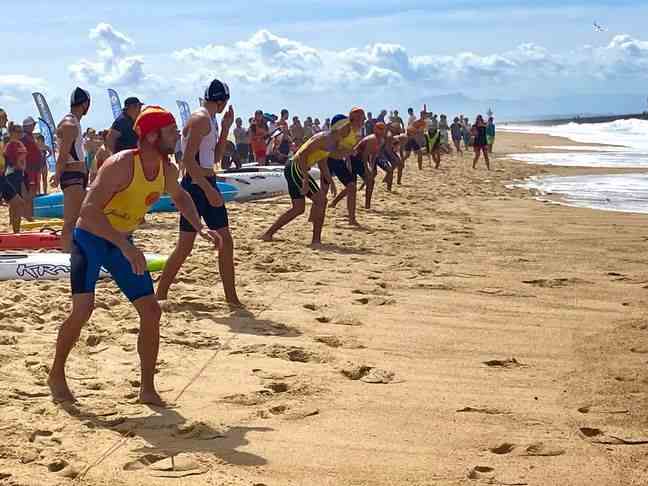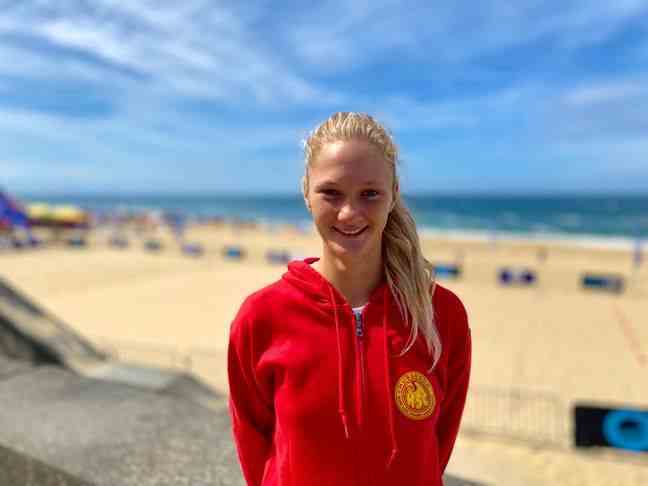Better known for surfing, Hossegor in the Landes is also the cradle of coastal sports rescue in France, born here in the early 1990s. “They are two rescue swimmers – who wanted to train outside the beach season , and to challenge themselves with other lifeguards – who had the idea of organizing events. One day a tourist told them that what they were doing was a sport in Australia, life saving surfing…” says Hervé Bouhineau, president of the Hossegor club. From there were created the first associations, attached to the french rescue federation.
Thirty years later, Hossegor hosts the French championships in the discipline until Saturday. Because, yes, coastal sports rescue is a real sporting discipline, even if it remains unknown in France. Less in the Landes and in the Basque Country, where this activity is now elevated “to the rank of traditions of the South-West, such as the pala or the chistera laughs Hervé Bouhineau.
“I have 650 members in my club, and I could have double if there was not a lack of swimming pool in the region, which limits training, assures the president of the Hossegor club. Very often, people come to register their child so that he learns to apprehend the waves of the ocean, and in the end the whole family finds it great, and discovers that it is a real sport with several disciplines. »
“It’s very high level”
Swimming, kayaking, boarding, with or without buoy-tube, races on the beach… Individually or in relay. The disciplines are numerous. “The idea is to offer events in the spirit of a rescue, like the swimming competition which consists of arriving as quickly as possible at a point, like going to a victim” says Mathieu Lacroix, the National Technical Director (DTN) of the federation.
And for those who imagine that coastal sport rescue would be a simple health walk between the beach and the ocean, it is enough to attend a race or two to realize the muscular power and the steely morale that the discipline requires. “The events are long, technical, and you have to be very thorough” describes Noé, who comes from the Biarritz club and has won several titles in various disciplines. “It’s very high level” insists Pierre Vilaceca, one of the vice-presidents of the federation.
A difficult but spectacular edition this year in Hossegor
Renowned for its waves, Hossegor is a real challenge for the 650 competitors qualified for these French championships. Especially for those who are more accustomed to the calm of the Mediterranean. Some are literally turned back when entering the ocean.

“We were often criticized for organizing our competitions on sites that were a little too flat, which is why we chose Hossegor for this year and next year, explains Mathieu Lacroix. The conditions are tough, there are some who can’t leave, but it’s spectacular. If it really became too difficult, we could relocate to the lake, we won’t put anyone in danger,” he explains.
The dream of the Olympics
Despite the conditions, good humor reigns between the teams on the beach. We encourage each other, we sleep nicely. Lifesaving Sport requires athletes of impeccable spirit. Like Nikita, 16, licensed in Hossegor. European champion of Iron Man (which mixes the different events), several times champion of France, she may be one of the rising stars of the discipline, she puts above all the collective. “I love the ocean, I love racing, but inshore rescue is more fun than just swimming, and we’re all together, not everyone in their own lane. Besides that, agility counts a lot, you have to be smart too – especially to fully understand the ocean – and have the mind. »

Nikita will be part of the French delegation which will leave at the end of the month for the world championships in Italy, the objective being to bring back a podium. “We are the first European nation, and the third nation in the world behind New Zealand and Australia, the two benchmark nations in the discipline. We will try to keep our rank,” hopes Mathieu Lacroix. “And since 2012, we have also been the biggest medal winners at the World Games, which are a bit like the antechamber of the Olympic Games,” adds Pierre Vilaceca.
The Olympic Games, a dream for the moment. which could come true. Coastal sports rescue hopes to become a demonstration discipline during the 2032 Olympics, which are to be held in Brisbane, Australia.
First aid and civil security missions
The French Rescue and First Aid Federation brings together several activities. “There is sports rescue, but also the whole training sector – in first aid, for lifeguards… – and a Civil Security section, which allowed us to be put forward during our rescue operations during the crisis. Covid-19” lists Mathieu Lacroix.
With 70,000 licensees, the Federation is today “in a good dynamic. » « We can start very early since we offer aquatic ease from the age of 3, after which we learn to swim, to save… Our young people can do lots of activities, at sea, in lakes, rivers… And then they can become first aiders, lifeguards, lifeguards. There are 5,000 MNS places to be filled every year throughout France, so there are opportunities. And we insist on the values of mutual aid, citizenship, we have many young people who find meaning in what they do. »

